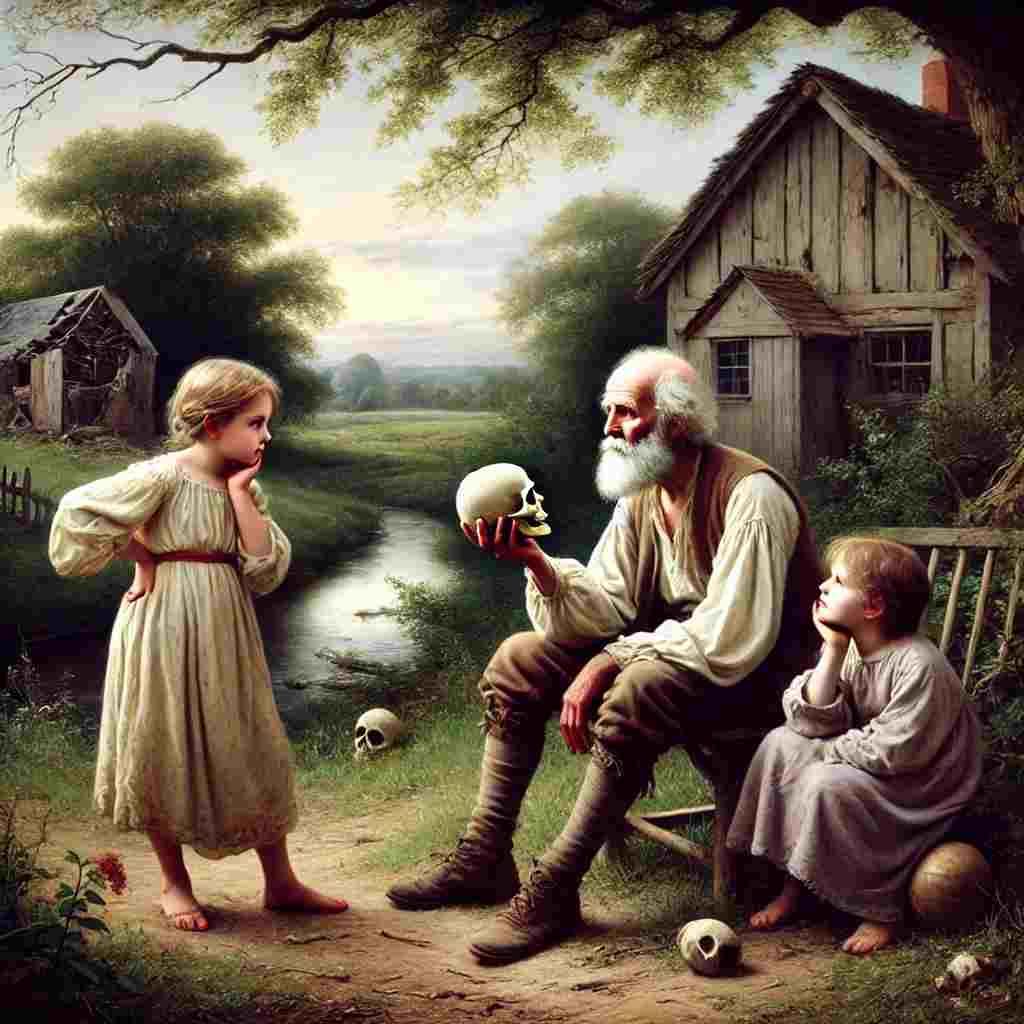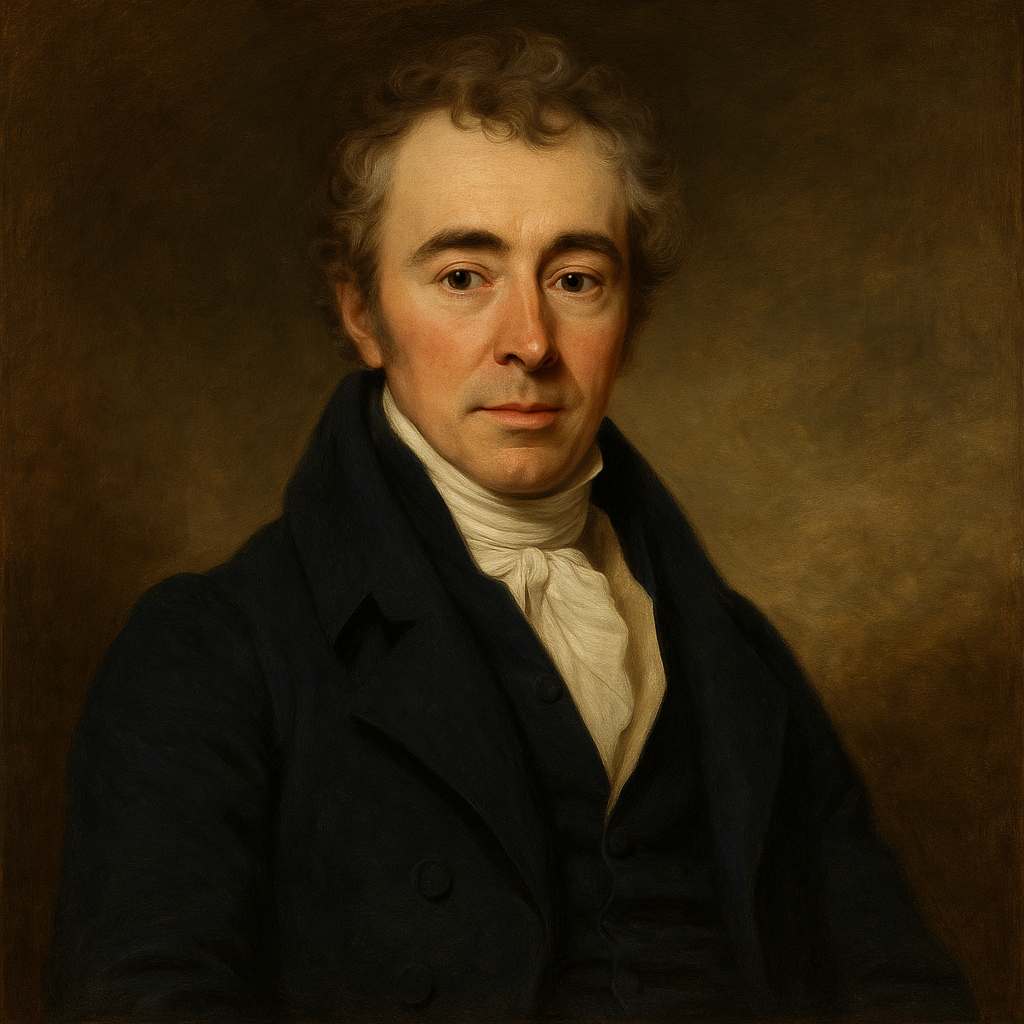The Battle of Blenheim
Robert Southey
1774 to 1843

It was a summer evening,
Old Kaspar's work was done,
And he before his cottage door
Was sitting in the sun,
And by him sported on the green
His little grandchild Wilhelmine.
She saw her brother Peterkin
Roll something large and round,
Which he beside the rivulet
In playing there had found;
He came to ask what he had found,
That was so large, and smooth, and round.
Old Kaspar took it from the boy,
Who stood expectant by;
And then the old man shook his head,
And, with a natural sigh,
"'Tis some poor fellow's skull," said he,
"Who fell in the great victory.
"I find them in the garden,
For there's many here about;
And often when I go to plough,
The ploughshare turns them out!
For many thousand men," said he,
"Were slain in that great victory."
"Now tell us what 'twas all about,"
Young Peterkin, he cries;
And little Wilhelmine looks up
With wonder-waiting eyes;
"Now tell us all about the war,
And what they fought each other for."
"It was the English," Kaspar cried,
"Who put the French to rout;
But what they fought each other for,
I could not well make out;
But everybody said," quoth he,
"That 'twas a famous victory.
"My father lived at Blenheim then,
Yon little stream hard by;
They burnt his dwelling to the ground,
And he was forced to fly;
So with his wife and child he fled,
Nor had he where to rest his head.
"With fire and sword the country round
Was wasted far and wide,
And many a childing mother then,
And new-born baby died;
But things like that, you know, must be
At every famous victory.
"They say it was a shocking sight
After the field was won;
For many thousand bodies here
Lay rotting in the sun;
But things like that, you know, must be
After a famous victory.
"Great praise the Duke of Marlbro' won,
And our good Prince Eugene."
"Why, 'twas a very wicked thing!"
Said little Wilhelmine.
"Nay... nay... my little girl," quoth he,
"It was a famous victory.
"And everybody praised the Duke
Who this great fight did win."
"But what good came of it at last?"
Quoth little Peterkin.
"Why that I cannot tell," said he,
"But 'twas a famous victory."
Robert Southey's The Battle of Blenheim
Robert Southey’s poem The Battle of Blenheim (1796) reflects on the devastating human cost of war while satirizing the glorification of military triumphs. Set in a pastoral scene, the poem contrasts the innocence of children with the resigned fatalism of an old man who recounts the horrors of war without fully grappling with its implications. Through its conversational tone, repetition, and ironic juxtaposition of content and form, the poem critiques the cyclical nature of violence and the shallow memorialization of wars.
Form and Structure
The poem is structured in rhymed quatrains with an ABAB rhyme scheme. The steady rhythm and simple, almost nursery-rhyme quality of the verse enhance the irony, as this light and unassuming form contrasts starkly with the grim subject matter. This stylistic choice mirrors the way war is often romanticized or trivialized in collective memory.
Thematic Analysis
-
The Innocence of Childhood
The poem begins with a serene and idyllic image: Old Kaspar sits by his cottage, enjoying a summer evening, while his grandchildren, Peterkin and Wilhelmine, play nearby. This pastoral tranquility sets the stage for a jarring shift as the children discover a skull—a remnant of the so-called "great victory."- The children’s curiosity, especially Peterkin’s repeated questioning, underscores their innocence and their attempt to make sense of the incomprehensible violence that has intruded into their world. Wilhelmine’s moral clarity when she calls the events "a very wicked thing" contrasts sharply with Kaspar’s resigned acceptance.
-
The Futility of War
Kaspar’s refrain, “But ’twas a famous victory,” encapsulates the poem’s critique of war. The phrase, repeated throughout, grows increasingly hollow as Kaspar recounts the destruction wrought by the Battle of Blenheim. The deaths, suffering, and displacement—illustrated vividly by descriptions of "childing mothers" and "rotting" corpses—are dismissed as necessary sacrifices for an abstract idea of "fame."- The children’s persistent questioning—“What good came of it at last?”—highlights the emptiness of Kaspar’s response. His inability to articulate any tangible benefit from the victory reflects the senselessness of the carnage and the shallow valorization of war in history.
-
Irony and Historical Critique
The poem is deeply ironic, particularly in Kaspar’s tone. While he recounts atrocities such as burning homes, mass death, and famine, he repeatedly asserts the “fame” of the victory as if this fame justifies the suffering. Southey uses this irony to expose the disconnect between the lived reality of war and its glorification in historical narratives.- The poem specifically critiques the Battle of Blenheim (1704), a major conflict during the War of the Spanish Succession, celebrated in Britain for the Duke of Marlborough’s triumph. By focusing on the perspective of ordinary people, Southey shifts attention away from the victors to the human costs that are often ignored in official accounts.
-
Resignation and Memory
Old Kaspar represents a generational attitude of resignation to war as an inevitable and even honorable part of life. He finds skulls while plowing his fields but regards them as a normal consequence of war. This normalization of violence is contrasted by the children’s moral questioning, suggesting a tension between inherited narratives and the possibility of a more critical understanding of history.- Kaspar’s inability to answer Peterkin’s question—“What good came of it at last?”—is particularly poignant. It reflects the futility of justifying war’s destruction and suggests that its glorification often masks an absence of meaningful outcomes.
Literary Devices
-
Repetition
The refrain “’Twas a famous victory” becomes increasingly ironic with each repetition, emphasizing the emptiness of the phrase. This repetition also mimics the way societal narratives are passed down uncritically, becoming hollow platitudes. -
Imagery
Southey employs vivid imagery to convey the horrors of war, such as “rotting in the sun” and “fire and sword the country round.” These images serve as a stark counterpoint to the casual tone of Kaspar’s recounting, underscoring the dissonance between the glorification of war and its grim realities. -
Dialogue and Perspective
The conversational structure, with the children’s questioning and Kaspar’s responses, allows Southey to contrast perspectives. The innocence and moral clarity of the children juxtapose the fatalistic and uncritical acceptance of the old man, revealing the generational perpetuation of war myths.
Conclusion
The Battle of Blenheim is a masterful critique of the glorification of war and the shallow narratives that often dominate historical memory. Through irony, repetition, and the interplay of innocence and resignation, Southey invites readers to question the cost of war and the values that underpin its commemoration. The poem’s enduring relevance lies in its capacity to challenge uncritical acceptance of violence as a necessary or noble aspect of human history. By foregrounding the human cost of war, Southey reminds us of the importance of remembering not just the victories, but the lives irreparably altered in their pursuit.
This text was generated by AI and is for reference only. Learn more
Want to join the discussion? Reopen or create a unique username to comment. No personal details required!



Comments
No comments yet. Be the first to comment!